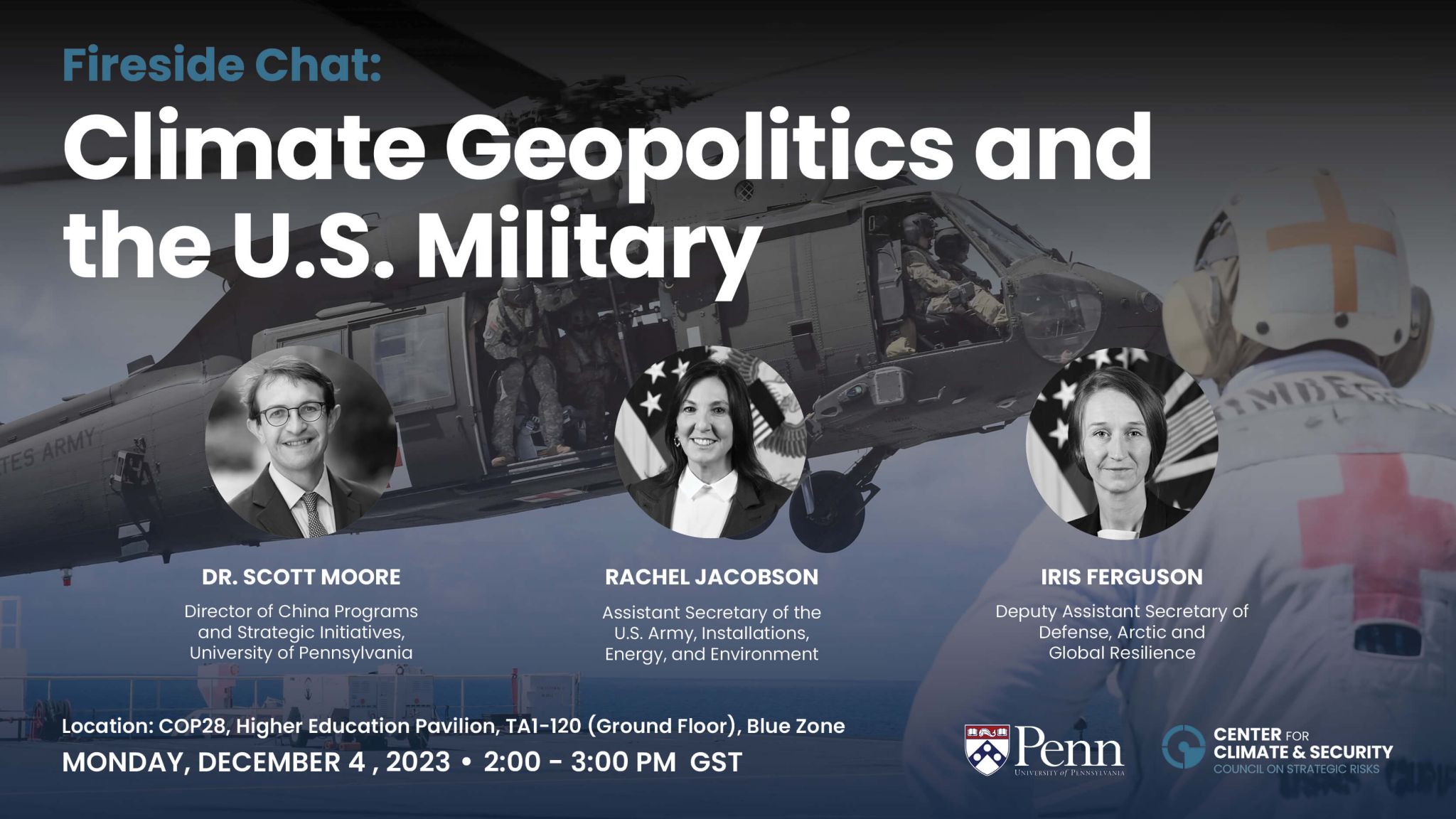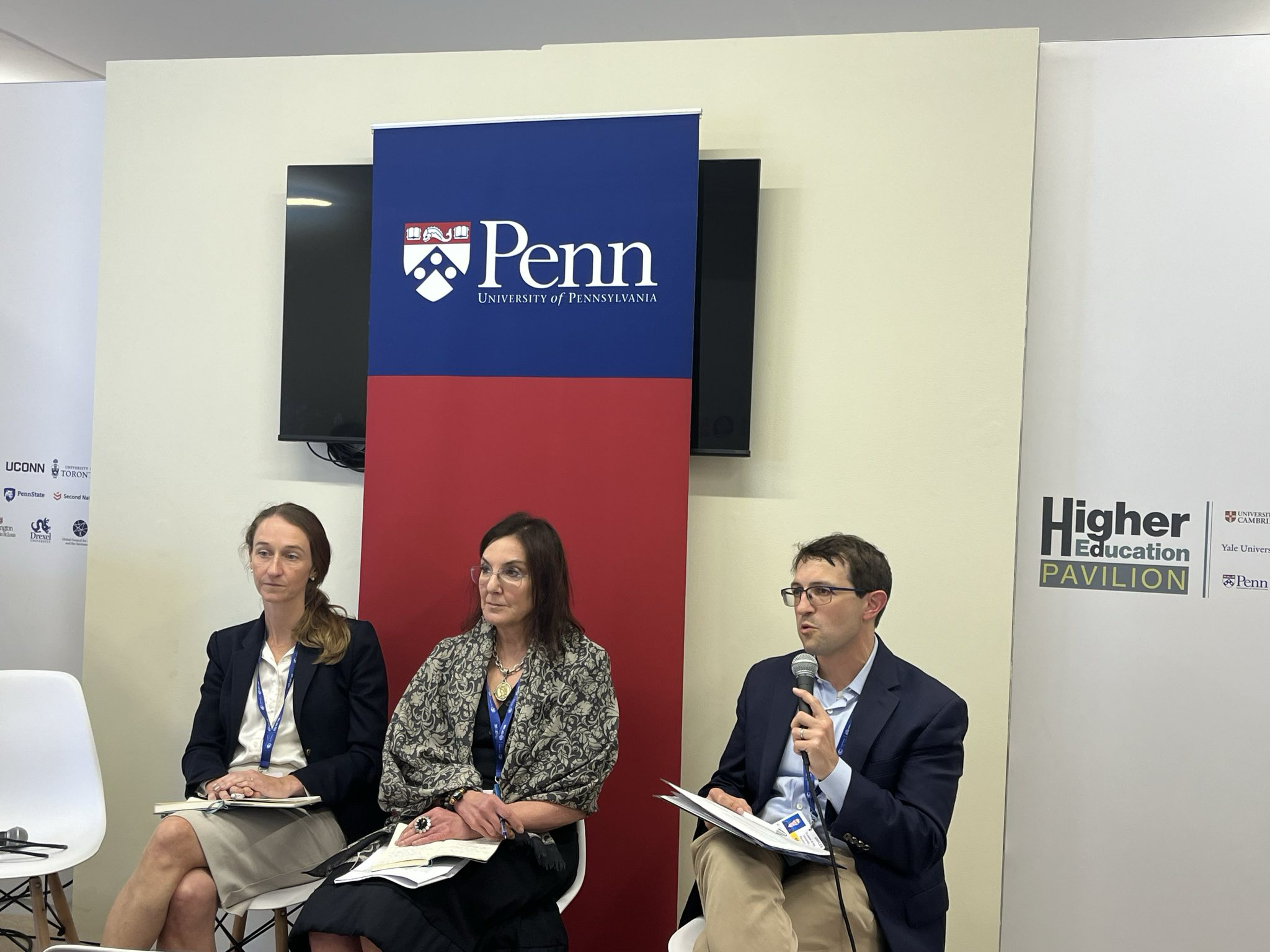A Focus on Water at COP28

Once upon a time, water sector folks could rightly complain that water received little attention in international climate policy, especially relative to energy. That’s been changing for some time, and water was a focus of last year’s Conference of the Parties (COP) to the United Nations Framework Convention on Climate Change (UNFCCC). The focus on water continued to build at this year’s COP, which I attended as part of Penn’s nearly 30-strong delegation. I participated in several water-related events, including one on integrating water into National Adaptation Plans (NAPs) and other discussions on climate security, where there was substantial concern for the impact of growing water scarcity and variability. Here are some things I heard on water:
 When it comes to NAPs, data and research is important, but it isn’t everything. The political economy of water is more difficult than for just about any other resource, and we need to focus on what we can do, not necessarily what we should do.
When it comes to NAPs, data and research is important, but it isn’t everything. The political economy of water is more difficult than for just about any other resource, and we need to focus on what we can do, not necessarily what we should do. - For nature-based solutions to water-related challenges, we need to marry science and research to traditional practice.
- For Bangladesh, one of the countries most vulnerable to water-related climate challenges, the biggest issue is salinization linked to sea level rise, which is causing people to leave coastal areas as the land becomes too difficult to farm. At the same time, in expectation of future flooding, Bangladesh is raising dikes from a standard height of 3m to 6.5m.
- When it comes to the intersection of food and water security, we need crops that are salt resistant, heat resistant, *and* water-efficient.
- When it comes to climate security, water is the medium through which climate impacts translate into human insecurity, whether via flooding or drought.

Apart from water-specific events, I also followed several other issues at COP, and repeat some takeaways below:
- The ironies of holding a climate summit in a petrostate: For most of the developed world, the big question before the conference was whether the United Arab Emirates, which serves as host and president of the conference, could deliver on climate goals as a major oil and gas producer. The criticism was heightened by the UAE’s choice to appoint the head of its national oil company as COP president. But on COP’s opening day, the UAE proved the doubters wrong by delivering a decision to establish a fund to help vulnerable countries deal with the worst impacts of climate change – the first time in the nearly thirty-year history of COP that such an agreement has been reached on the first day. This is very significant because such funding, known in COP-speak as loss and damage, has long been a key demand of many countries, especially island nations who face potential erasure from sea level rise. Having delivered on this decision, the question now becomes whether COP-28, led by fossil fuels-rich UAE, will formally call for the end of fossil fuel use, or whether it will attempt to sanction the continued use of such fuels even as they contribute to more severe climate change. It is most likely that any final formulation will leave space for capture of some emissions so that they do not contribute to atmospheric climate change – “unabated” use of fossil fuels is one oft-mentioned construct.
- The many unanswered questions of climate finance: the establishment of the loss and damage fund is a major achievement, but in some ways this decision creates the space for a whole constellation of difficult climate finance questions to crowd the top of the COP agenda. These include: clean technology transfer and intellectual property sharing from developed to developing countries, cross-national carbon pricing and market formation, and non-loss and damage adaptation financing. There will be a major divide between developed and developing countries on all of these questions, but if some compromise is not reached, it may well hamstring future COPs.
- First global stocktake: one of the more substantive agenda items for this COP is the first global stocktake (GST), a process mandated under the Paris Agreement that is intended to compel signatories to evaluate progress toward Agreement goals and identify gaps and additional measures needed. Clearly, the answers are both many and a lot. So far, the GST has been mired by procedural discussion and wracked by dissension between developing countries regarding climate finance and other issues. This risks distracting from the ideal outcome of the GST which is a concise and powerful statement of the need to move much further and faster to reduce emissions.
- Climate security: Perhaps because the world has sadly seen an outbreak of warfare, security was a larger focus at this COP than in the past. NATO was visible and vocal, and an interesting message from the Secretary General was that every dollar demanded by war in Ukraine, the Middle East, and elsewhere is a dollar that’s unavailable for climate protection. At the same time, many of the conversations in which I participated highlighted the potentially important role that militaries can play in driving the deployment of important technologies like aviation and maritime electrification.
- Climate and health: This COP significantly elevated the connection between climate and health. As a result of commitments made here, climate adaptation now formally includes health, and some $1 billion has been earmarked for climate health initiatives. To be sure, that’s a small sum in proportion for the need, but given that things are starting basically from zero it’s exciting.
All in all, this COP is a reminder of how far climate policy has come, including on water, as well as how much work remains to be done.
- Climate Resilience
- Integrated Watershed Planning & Governance

